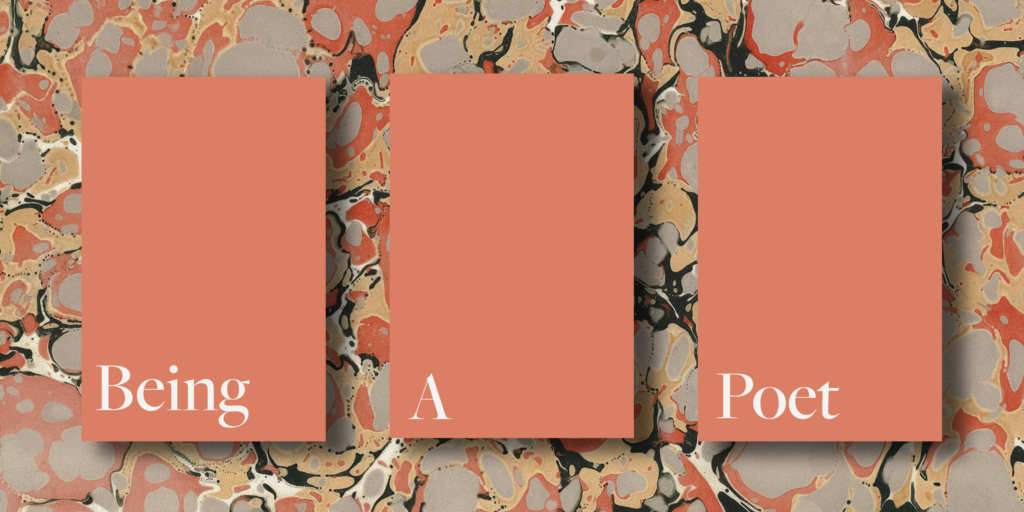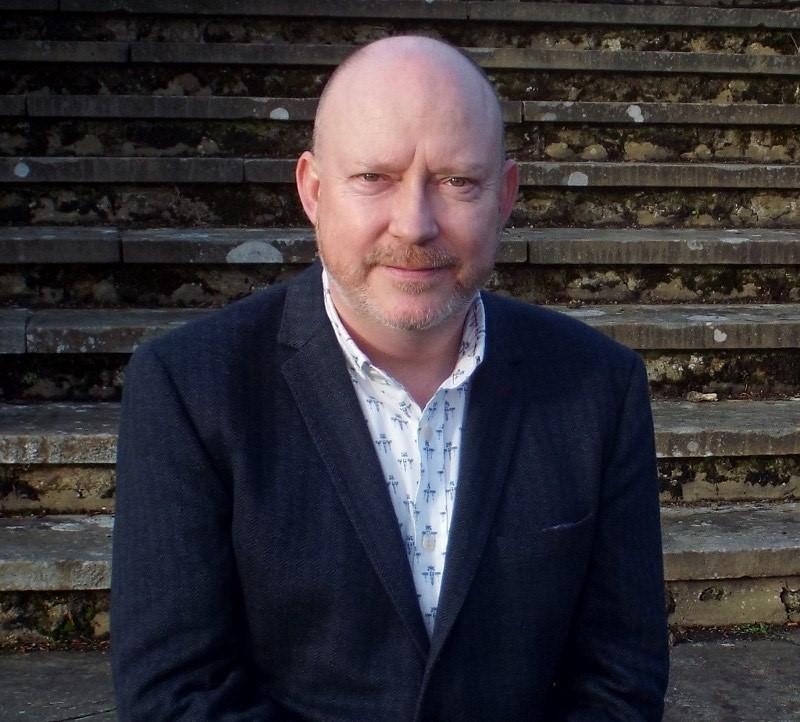In this series, we interview our tutors about poetry and its place in their world. These interviews will cover creative writing tips, excelling in a poetry workshop, building a literary career, and finding your poetic voice. Here’s Simon Barraclough on how cinema can inspire and improve your writing.
Simon will be teaching Jaws at 50 (‘You’re Gonna Need a Bigger Class’) with us this Summer, on Saturday 5 July.

Summarise ‘Jaws’ for us in a simple JAWS acrostic.
Jetties and jetsam, Li-Los and limbs,
A boat trip into the maw of darkness
Waves of crimson, waves of pain,
Summer will never be the same again.
How can film inspire poetry? Can you give an example of an effective poem on film?
Film can inspire poetry in many, possibly innumerable, ways. The look of a film, the sound of a film, the public buzz around a film1, themes, characters, memorable edits, slow zooms, crash zooms, long shots, match cuts, jump cuts, dreamlike associations, nostalgia for the first time you saw a film, nostalgia for the time in which a film is set, immersion in a period you have never known, memorable dialogue, an indelible image you need to unpack or expand on, unbearable suspense, uncontainable laughter, inspiring intertitles, perfect needle-drops, unlikely scenes that unleash unconscious memories, songs that connect disparate genres, confusing and questionable desires, visual analogies for intangible feelings… the list goes on, like an interminable horror franchise.
The second question is ambiguous – do you want an example of an effective use of a poem in a film or an effective poem about a film? I suspect you want the latter but I’m happy to try and answer both. For an effective use of a poem in a film, I rather like ‘somewhere i have never travelled, gladly beyond’ by E.E. Cummings in Hannah and Her Sisters (Allen, 1986).2
As for an effective poem about a film, I love Anne Carson’s ‘Kant’s Question about Monica Vitti’, which uses the tense, challenging, symbolic opening of Antonioni’s L’Eclisse (The Eclipse, 1962) as a springboard for philosophical reflection, formal experimentation, and a meditation on pleasure itself:3
Kant noted a rustling aside of sensible barriers.
Her unquiet drifts in her, spills, drifts on.
A rotating fan is shown sitting on the table beside the man in the armchair.
Kant felt weak as a wave
We’re back to waves. Waves of inspiration – who knows where the cinematic current will take you?
How can poets use cinematic techniques – like montage, jump cuts, or close-ups – in their writing?
This is the fascinating nub of the issue. Film and poetry can inspire and imitate each other but can never be identical art forms. Years ago, at a wedding party, after a little champagne,4 I declaimed that Milton had invented action cinema in Paradise Lost.5 An eminence from the British Film Institute was at my table and I expected to be shot down in flames, but he informed me of how Sergei Eisenstein was inspired by Milton’s war in heaven when scripting and shooting the great battle on the ice in Alexander Nevsky (1938).
Eisenstein writes about it in The Film Sense: ‘Paradise Lost itself is a first-rate school in which to study montage and audio-visual relationships.’6 I have shown film students clips of this epic alongside the poem and it’s always a treat to see them react to Eisenstein’s bristling spears that lift right off Milton’s page:7
Far in the horizon to the north appeared
From skirt to skirt a fiery region, stretched
In battailous aspect, and nearer view
Bristled with upright beams innumerable
Of rigid spears, and helmets thronged, and shields
And then, in 1967 (300 years after the publication of Milton’s great epic), Ken Russell used Eisenstein’s battle on the ice for the climactic battle on the ice of his flamboyant spy romp, Billion Dollar Brain. Sticking with Paradise Lost, recall the scene in Terminator 2: Judgment Day8 (James Cameron, 1991) when the liquid-metal T-1000 miraculously heals itself after being blasted and hewn in twain. Satan heals himself in a similar way, according to Milton:9
But the sword
Of Michael from the armoury of God
Was given him tempered so, that neither keen
Nor solid might resist that edge: it met
The sword of Satan, with steep force to smite
Descending, and in half cut sheer; nor staid,
But with swift wheel reverse, deep entering, shared
All his right side: Then Satan first knew pain,
And writhed him to and fro convolved; so sore
The griding sword with discontinuous wound
Passed through him: But the ethereal substance closed,
Not long divisible; and from the gash
A stream of necturous humour issuing flowed
Sanguine, such as celestial Spirits may bleed,
Looked at from this angle, poetry invented cinema (visual imagery, visible and audible rhymes, line breaks, enjambment, tracking shots, lighting effects) or, thinking psychoanalytically, poetry yearned to invent cinema – the desire for cinema lurked in its unconscious.
But now inspiration and innovation often flow in the opposite direction. If you are inspired by the opening credits to Psycho (Hitchcock, 1960), try rearranging fragments of dialogue and observation, aligning them sympathetically across the page, like Matthew Welton does in Psycho Poetica.10 Enchanted by the opening of A Matter of Life and Death, I wrote a poem called ‘We’ll Always have CGI Paris’, which zooms quickly from the edge of the galaxy to the top of the Eiffel Tower.
Would you like to recreate the energy and flow of the Copacabana one-shot in Scorsese’s Goodfellas? The page, the line, punctuation, and your imagination are the only equipment you’ll need. How would it look? How would it sound? How would it read? Writing poetry is at the opposite end of the spectrum of cost to making cinema but can achieve similar.
What films feel like poetry to you?
Off the top of my head:
Il Deserto Rosso
The Colour of Pomegranates
Melancholia
The Tree of Life
Flow
Suspiria (1977)
Portrait of a Lady on Fire
Eraserhead
The Tales of Hoffman
Viy
Vertigo
Don’t Look Now
Kundun
Weekend (1967)
Penda’s Fen
Anything by Maya Deren …
How can poets learn to use film in their writing?
If poets would like some hands-on, in-person help from me, the best thing to do is to sign up for my one-day workshop on Jaws at 50 on July 5th, 2025. Otherwise, keep watching, reading and writing.

Simon Barraclough has taught many classes at The Poetry School and is the author of several poetry collections and pamphlets, including his Forward-debut, Los Alamos Mon Amour, Bonjour Tetris, Neptune Blue, Sunspots, Iarnród Éireann, and his brand new book, Divine Hours (Broken Sleep Books, 2024). He devised the multi-poet, multimedia events Psycho Poetica and Vertiginous and toured Sunspots as a one-man show with songs and films in 2015/2016. In 2014 he was writer in residence at the Mullard Space Science Laboratory and is one of three editors behind the new humanity-in-space website Project Aboena. A cinema addict from a very early age, Simon often writes about film and loves to investigate the fruitful similarities and differences between poetry and cinema.
- See, obviously, Jaws, in 1975/1976 ↩︎
- ‘nobody, not even the rain, has such small hands’. ↩︎
- From Decreation (Jonathan Cape, 2006) ↩︎
- Champagne (Alfred Hitchcock, silent, 1928) ↩︎
- Paradise Lost (John Stockwell, horror, 2006) – very little to do with Milton! ↩︎
- The Film Sense (Faber and Faber, 1986) ↩︎
- Paradise Lost (John Milton, 1667), Book VI, lines 80–84. ↩︎
- What a day – the day when Eve and Adam ate of the forbidden fruit? ↩︎
- Paradise Lost Book VI, lines 320–333. ↩︎
- Psycho Poetica (Ed. Simon Barraclough, Sidekick Books, 2010) ↩︎
Add your Reply
You must be logged in to post a comment.